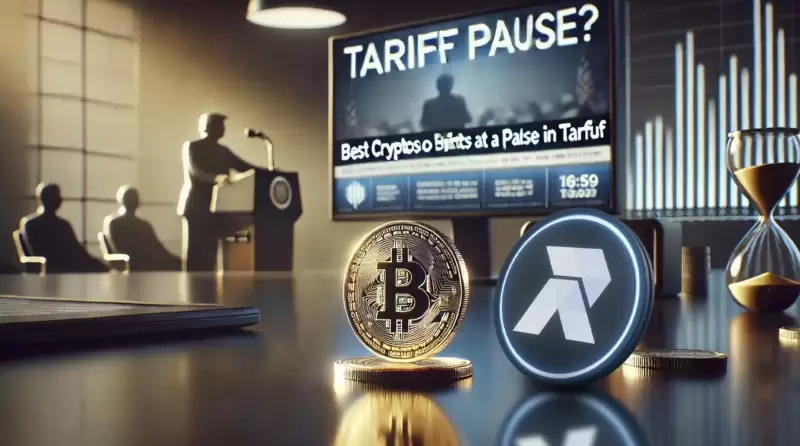 |
|
 |
|
 |
|
 |
|
 |
|
 |
|
 |
|
 |
|
 |
|
 |
|
 |
|
 |
|
 |
|
 |
|
 |
|
Cryptocurrency News Articles
The International Monetary Fund is warning countries about an impending global recession
Apr 14, 2025 at 11:51 pm
The International Monetary Fund is warning countries about an impending global recession

The International Monetary Fund (IMF) is sounding the alarm on an impending global recession, attributing US President Donald Trump's tariff strategy and geopolitical indifferences as factors that could destabilize global financial markets, according to a report released Monday.
As the world lender prepares for its spring meeting on April 21, where Trump's tariff policies are expected to dominate the agenda, it has cautioned that escalations in geopolitical risk, especially related to trade conflicts, could lead to major and lasting corrections in global asset prices.
This assessment follows several weeks of volatility in global financial markets. Since Trump's January 20 inauguration for a second term, the S&P 500 index has fallen more than 10%, bond markets have experienced several swings on both sides, and gold prices have surged to record highs.
The global lender's report highlights how financial institutions are coping with market whiplash. Institutions such as banks, hedge funds, private equity firms, and pension funds face elevated risks from large, unpredictable market moves.
"Major geopolitical risk events can trigger large and persistent corrections in asset prices, generating market volatility that could threaten macro-financial stability," the IMF stated.
The Fund's assessment also includes several geopolitical threats over the past decade, discussing the US-China trade war during Trump's first term, which it reckoned would add to the recession fears, albeit slightly.
Other geopolitical elements, like Russia's invasion of Ukraine, were listed as examples of global market impact events. Still, the Fund reiterated that Trump's focus on trade in his second term is more aggressive than the POTUS's first tenure at the White House.
Data shows that the United States has raised tariffs to the highest level in a century, while China has responded in kind. The world's two largest economies are now imposing import levies exceeding 100% on each other's goods, effectively doubling the price of cross-border products.
Such protectionist policies, the IMF warned, are increasing the difficulty for investors in accurately pricing geopolitical risks. This uncertainty could lead to what it described as "sharp market reactions," compounding the threat of volatility.
In the statement, IMF Managing Director Kristalina Georgieva has spoken against “Liberation Day,” adding that the president's tariff program “clearly represented significant risk” to the global economy.
Georgieva, like most analysts who are worried about Trump tariffs, asserted that the longer-term consequences of the taxes will increase the so-called “market tail risks.” These refer to the likelihood of rare but severe portfolio losses, such as during a financial crash. And if the risks grow, she asserted, so does the possibility of a market collapse.
“Geopolitical tensions and abrupt policy shifts heighten investor anxiety. This can contribute to feedback loops where falling asset prices further erode investor confidence, amplifying downward pressure on markets,” the director added.
She also cautioned nations about the effects of tariffs on sovereign debt markets. Sovereign risk premiums, which is the cost of credit default swaps that protect against government default, are rising.
The yield on the US 10-year Treasury note stood at 4.43% on Monday, after rising steeply last week, based on over-the-counter interbank quotes for the government bond's maturity. This, the Fund said, could spill into other countries through international trade and finance channels, particularly in emerging markets with higher debt burdens.
Meanwhile, a recent survey by Reuters shows that consumer confidence in America has dropped because of fears over inflation, which has climbed to its highest point since 1981. That sentiment is evident in several major global investment banks, many of which have recently flagged recession possibilities stemming from Trump's economic policies.
The IMF also released an accompanying blog examining the impact of US-China tariff actions between 2018 and 2024. It found that announcements during that period consistently pushed stock markets lower in both America and the East Asian country.
Disclaimer:info@kdj.com
The information provided is not trading advice. kdj.com does not assume any responsibility for any investments made based on the information provided in this article. Cryptocurrencies are highly volatile and it is highly recommended that you invest with caution after thorough research!
If you believe that the content used on this website infringes your copyright, please contact us immediately (info@kdj.com) and we will delete it promptly.
-

-

-

- As President Donald Trump Hints at a Potential Pause in Tariff Implementations, Investors Are Closely Watching How This Geopolitical Shift Could Impact Global Markets
- Apr 16, 2025 at 06:25 am
- As President Donald Trump hints at a potential pause in tariff implementations, investors are closely watching how this geopolitical shift could impact global markets
-

-

-

- US President Donald Trump is venturing deeper into the world of digital assets, with a new project blending gaming and cryptocurrency elements
- Apr 16, 2025 at 06:20 am
- The project, set to launch in late April, will resemble MONOPOLY GO!, a mobile game where players travel around a board and earn money
-

-

-





























































